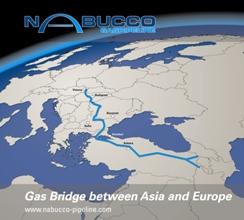Banks consider 4bn euros for Nabucco gas pipeline

BRUSSELS – Plans for the giant Nabucco gas pipeline to bring Central Asian gas to Europe took a step forward on Monday, when the consortium announced the involvement of three international financial institutions.
The $10 billion project aims to help wean Europe off its dependency on Russian gas by transporting up to 31 billion cubic metres of gas a year from the Caspian region to an Austrian gas hub via Turkey and eastern Europe.
The Nabucco consortium said it had signed an agreement with the European Investment Bank (EIB), the European Bank for Reconstruction and Development and the World Bank's International Finance Corporation, whereby the three banks will start due diligence for loans that could reach 4 billion euros ($5.2 billion).
"We are at the beginning of the appraisal process - it is not predetermined," EIB executive Thomas Barrett told reporters. "But the fact we are ready to identify a potential 4 billion euros can be taken as a very serious remark."
The European Commission, which also plans to grant up to 200 million euros to the project, welcomed the move and said the pipeline will help bolster Europe's energy security.
This year is seen as critical for Nabucco, which faces tough competition from Russia's planned South Stream pipeline via the Black Sea, and from two much cheaper European projects to import gas via Turkey - the Trans-Adriatic Pipeline and ITGI.
Other challenges are continuing weak European gas demand due to the economic crisis, and increasing competition with China for Central Asian supplies.
Appraisal
Appraisal process of the Nabucco gas pipeline project was launched
by the signing of a mandate letter by the International Financial
Institutions - the shareholders of Nabucco Gas Pipeline
International GmbH.
The signing of the mandate letter is a required step towards a potential financing package of up to 4bn euros, Nabucco Gas Pipeline company reported.
The letter was signed by the European Bank for Reconstruction and Development (EBRD), the European Investment Bank (EIB) and International finance Corporation (IFC), a member of the World Bank Group.
The potential financing package will include up to 2bn euros from the EIB, 1.2bn euros from the EBRD (600mln euros from EBRD account and 600mln euros to be syndicated to commercial banks) and around 800mln from IFC (400mln euros from IFC account and 400mln euros to be syndicated to commercial banks).
The Nabucco gas pipeline project is the flagship project for meeting future EU gas demand and will diversify Europe's pool of supplier countries.
The involvement of the three international financial institutions is a demonstration of global and European support for the project and represents an important milestone in ensuring the overall financing of Nabucco.
The early involvement of the financial institutions will support Nabucco in meeting the highest standards in environmental and social risk evaluation and procurement. The appraisal of the project will include a thorough assessment of commercial, social and environmental aspects.
Following the successful conclusion of the appraisal, the financing will need to be approved by the relevant governing bodies of all international financial institutions. Export credit agencies and international banks are expected to commence their appraisal of the Nabucco project soon after the international financial institutions. Commitments from potential lenders are expected to be sought in 2011.
Political support
Nabucco shareholder RWE of Germany, said the agreement with the
banks was proof of strong political support for the project.
"It is another clear signal to supplier countries that Nabucco has the full political support of Europe and the international community," said Stefan Judisch, chief executive of RWE Supply & Trading.
The final investment decision by Nabucco's backers will be made in the first quarter of next year, another shareholder Austria's OMV said recently.
Nabucco Managing Director Reinhard Mitschek said it might take longer for all the elements to fall into place.
Nabucco's gas transport contracts could be negotiated quickly once gas buyers and suppliers have completed their negotiations, he said. The banks are expected to make their decision sometime in 2011.
"I'm confident we'll close the whole financing package in Q3 or Q4," he told Reuters. "In 2012, we'd start construction and in 2015 the first gas would flow."
Construction of the Nabucco pipeline will be implemented in two main phases. The first phase of construction (2011) includes laying a new pipeline with a length of 2,000 kilometers, starting at the Turkish border and ending in Austria's Baumgarten. The second phase (2014-2015) includes the construction of the remainder of the pipeline on the border between Turkey and Georgia, as well as Turkey and Iraq.
The first gas supplies via the Nabucco pipeline are planned in 2014. Maximum pipeline capacity is expected to make up 31 billion cubic meters per year.
Nabucco Gas Pipeline International shareholders will invest 30 percent of total cost of the project, the rest 70 percent will be paid owing to loans.
The Nabucco pipeline project aims to decrease the European Union’s dependence on Russian imports by bringing Caspian gas to a hub in Austria via the Balkans. The gas would be shipped to Europe via Turkey, Bulgaria, Romania and Hungary. Construction of Nabucco will begin in 2011, as the recent gas crisis between Russia and Ukraine has convinced decision-makers of the need to speed up the project.
The project, worth 7.9 billion euros, is managed by the Vienna-based Nabucco Gas Pipeline International. Partners in the consortium with equal stakes of 16.67% are Austrian OMV, Hungarian MOL, Bulgarian Bulgargaz, Romanian Transgaz, Turkish Botas and German RWE.
Here we are to serve you with news right now. It does not cost much, but worth your attention.
Choose to support open, independent, quality journalism and subscribe on a monthly basis.
By subscribing to our online newspaper, you can have full digital access to all news, analysis, and much more.
You can also follow AzerNEWS on Twitter @AzerNewsAz or Facebook @AzerNewsNewspaper
Thank you!
